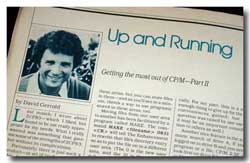Apparently the month of February was too traumatic to write about. Well, not really. Actually I’ve been doing a ton of writing just none that’s appeared in these pages (yet).
 Sci-Fi David Gerrold wrote in tech magazine in the early 1980s about this neat piece of software called iChing, which mimicked the function of the Confucian book. The program had a primitive AI used to offer “predictions” to the users. But what Gerrold discovered about the program wasn’t it’s powerful ability to predict the future but it’s ability to move the user to discover what the user really wanted to do in the first place. In other words, if the user is contemplating a decision between two choices, because iChing comes down with one choice, it forces the thoughtful user to explore reasons to either agreed or disagree with the iChing. It’s not the technology but the human reaction to the choices mediated by the computer.
Sci-Fi David Gerrold wrote in tech magazine in the early 1980s about this neat piece of software called iChing, which mimicked the function of the Confucian book. The program had a primitive AI used to offer “predictions” to the users. But what Gerrold discovered about the program wasn’t it’s powerful ability to predict the future but it’s ability to move the user to discover what the user really wanted to do in the first place. In other words, if the user is contemplating a decision between two choices, because iChing comes down with one choice, it forces the thoughtful user to explore reasons to either agreed or disagree with the iChing. It’s not the technology but the human reaction to the choices mediated by the computer.
So, that said, in mid-January I activated my e-Harmony account. I had filled out the initial questionnaire months before. Slowly but surely names popped up in my queue and with each name I was instructed to pick five questions from a list to ask them and then in turn to answer their five question.Then once those questions were answered a next set of three questions with space for longer answers were exchanged. With e-Harmony delivering an average of five names a night, asking and answering five questions and then three more, I found myself (1#) answering a lot of questions and (2#) answering the same questions a lot of times.
 Gradually I began to notice what I’ll call the “Gerrold Effect” where it wasn’t about the technology but my reaction to the technology. The process was forcing me to seriously and deeply consider what I really wanted in a mate. Yes, the service was delivering far more names than I would have ever met through any network of friends and relatives, but more than that it was making me do more than just look for pretty pictures. JBB
Gradually I began to notice what I’ll call the “Gerrold Effect” where it wasn’t about the technology but my reaction to the technology. The process was forcing me to seriously and deeply consider what I really wanted in a mate. Yes, the service was delivering far more names than I would have ever met through any network of friends and relatives, but more than that it was making me do more than just look for pretty pictures. JBB










